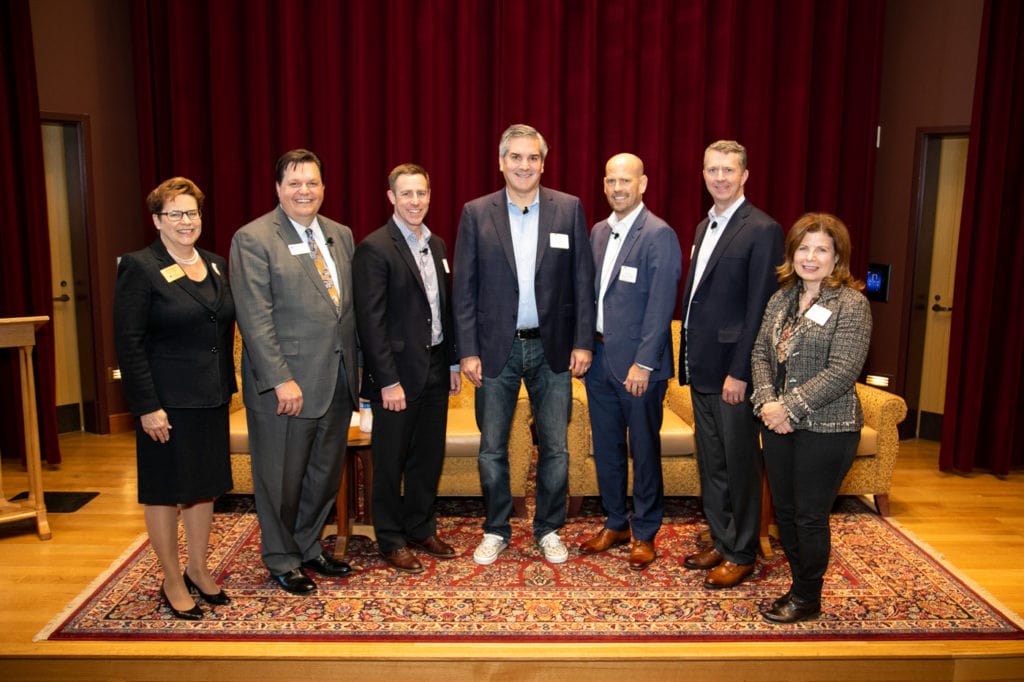Eighth-annual Accountancy Town Hall features panel discussion with new Denver financial executives
Colorado natives have long known the appeal of the Mile High City—from our majestic mountains and year-round sunshine, to our numerous parks, breweries and options for outdoor recreation. But for the companies that relocate their businesses—and hundreds to thousands of employees—to Denver, several key selling points stand out.
On Oct. 2, the School of Accountancy at the Daniels College of Business hosted its eighth-annual Accountancy Town Hall at the Reiman Theater to discuss Denver’s appeal as a business hub. Daniels and community attendees gathered for the panel discussion among four financial executives from companies that recently moved their headquarters or major operations to the Denver metro area.

Left to right: J.J. Ament, Scott Roe, Kent Clark, Rick Seidlitz, Randy Lynch
Those panelists included Kent Clark, senior vice president, brokerage product services at Charles Schwab; Rick Seidlitz, vice president and corporate controller for Arrow; Scott Roe, vice president and chief financial officer of VF Corporation; and Randy Lynch, senior vice president, finance, treasurer and corporate development at Maxar.
J.J. Ament, CEO of the Metro Denver Economic Development Corporation, moderated the panel. The executives discussed four main reasons for moving their companies and staff to Denver:
Proximity to stakeholders on both coasts
“It’s really about a central location, time zones and being able to service the client in different parts of the country at the same time,” said Clark. Charles Schwab’s headquarters remains in San Francisco, but the company has a 4,500-person (and growing) campus in Lone Tree, Colorado.
Available talent and easy recruitment
“Some folks were skeptical about how the talent pool would compare to a larger market like New York, but we’ve found it to be comparable,” said Seidlitz. “As good as people in Denver are, sometimes it’s hard to fill open positions because it’s competitive. We end up hiring some key positions from people out of state. Denver is a desirable location where people want to live, so to some extent it makes no difference to us if it’s someone who’s already here or someone who wants to live here.” Arrow gradually began relocating its headquarters from New York to Denver in 2012.
Outdoor, active lifestyle
“If you think of outdoor companies, what do you think about? You want to go to the Rocky Mountains—you want to go to Denver, Boulder. This corridor is the seat of the outdoor industry. You can live in the country and be a rancher, or you can live in LoDo and have a very different lifestyle. You can kind of find it all here,” said Roe. VF Corporation manages 26 global retail brands, including Vans, Smartwool and The North Face. The company relocated its corporate headquarters to Denver after spinning off its North Carolina-based jeans brand, and struggling to attract and retain labor in the Bay Area due to California’s high cost of living.
Alignment of Denver’s culture and diversity with brand values
Lynch, who works at Westminster, Colorado-based Maxar, said, “If the corporate culture is totally disparate from your community culture, you’ll never attract the right people. Our corporate culture sort of matches the Denver culture. It wouldn’t do that in other locations, but it certainly does here and it’s a core aspect of who we are.” The satellite imaging company also relocated from Northern California after a merger two years ago, and relies on Colorado’s large aerospace engineering talent base. “The people we find here are very consistent with the way we operate—incredibly hard-working during the day, and then out on the slopes or the golf course on the weekends,” he said.
Ament then asked about the role of state and local tax incentives in panelists’ decisions to choose Denver, explaining to the audience that Colorado offers modest, performance-based corporate incentives that don’t put tax payers at risk.
Panelists were unified in their responses, expressing that while incentives are helpful in covering the added expenses of moving facilities and rebuilding a talent base, they weren’t the primary reason they chose Colorado—again citing the business climate, culture and available talent pool as more pertinent deciding factors.

School of Accountancy Director Sharon Lassar (left) and Truth in Accounting CEO Sheila Weinberg (right) with Accountancy Town Hall panelists and moderator
Truth in Accounting sponsored the Town Hall. The non-partisan nonprofit helps governments produce financial report cards that are easy to understand. In 2019, Denver received a “C” letter grade, while Colorado received a “D” for fiscal health. Truth in Accounting’s report cites the city and state’s shortfalls of $1.1 billion and $14.5 billion, respectively, for the grades (most of the debt is due to unfunded retirement obligations).
Panelists also voiced concerns about the increasing housing costs and commute times that come with Denver’s skyrocketing popularity—and urged the city to increase affordable housing options close to where employees work, and to continue expanding public transportation.
Despite the negative balance sheets and even with states like Texas, Florida and Washington offering lower taxes and costs of living, Denver is a place where employees want to live and work, and retaining good talent helps sustain companies’ bottom lines. New residents and businesses also contribute to the local economy in droves.
“The community from both a personal and professional standpoint has been extraordinarily welcoming. It’s really kind of shocking how nice people are. It’s a real testament to the community,” Roe said.
“We’re really glad you’re all here,” Ament replied.
